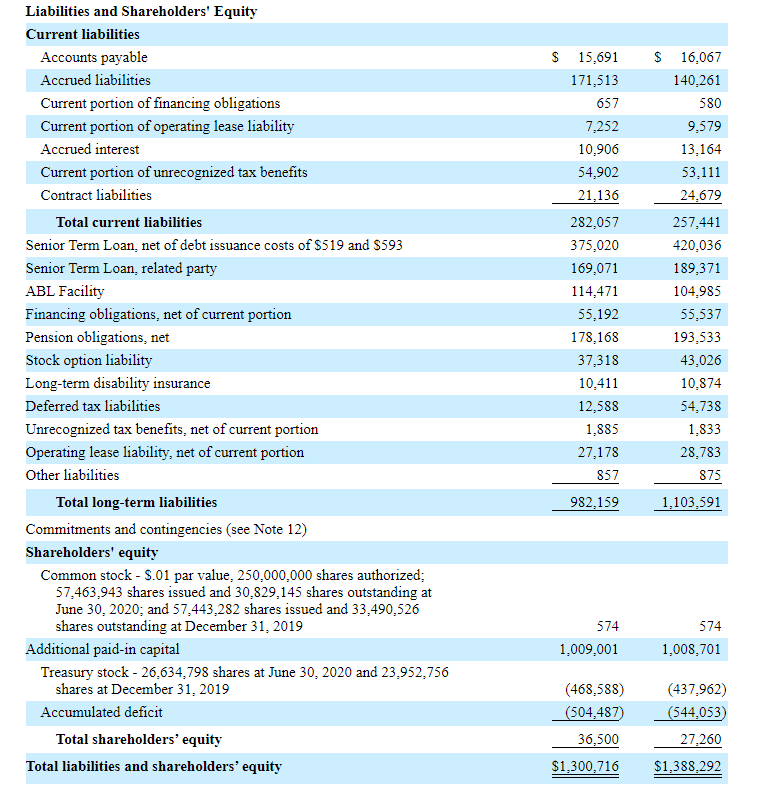Thryv Holdings (THRY) Notes
1/11/2021 Update
- Good article laying our the bull case
- 2 companies.
- 1 bad company that is in secular decline.
- 1 SAAS company that looks cheap.
- John Paulson is pushing for the company to spin off the good company.
- Bad business is $1.1BN in revenue declining 20% per year. Yellow Pages.
- 2 companies.
- Management:
- The company is run by Joe Walsh. He owns over 6% of the company via call options. So, it’s fair to say that he wants to see the stock do well. Previously, he built a competitor to the Yellow Pages, sold it to a larger company, then grew it more, then sold that to a public company.
- John Paulson asked about potential spin-off:
- Whole company is being valued right now on cash that its generating.
- Thryv will be the platform that many businesses uses to run its business. Going to be a great asset.
- Not too concerned that value is not being recognized right now.
- Probably is a time out in the future when it may make sense to separate these businesses. Two businesses benefit tremendously from being together.
- Not overly concerned that haven’t crystalized that future value today.
- Just want to build a company that is really helpful for small businesses.
- Think there will be a re-rating when growth is recognized.
- Honestly probably grew too fast for a while. Sold to some customers that probably shouldn’t have sold to. Took a while to work those off.
- Now have a tight client profile. Know exactly who they should sell to.
- Probably is a benefit from separating these businesses. But his prediction is the companies will benefit from being together over the next couple of hears.
- Paulson pushed back and said spin-off shouldn’t happen tomorrow but should happen within the next year. He owns 10% of the stock.
10/8/2020 Update
- Good Barron’s article highlighting Thryv Holdings (THRY). Notes from article:
- Yellow pages publisher and cloud-based marketing services company.
- Started trading on Thursday via direct listing.
- Why direct listing?
- No need to raise cash.
- Profitable and generates plenty of cash to fund operations and growth.
- Didn’t want to pay millions in fees and dilute insiders through issuance of more shares.
- Thryv was created in a 2017 merger between “Dex Media, a Yellow Pages publisher that filed for Chapter 11 bankruptcy protection in 2016, and YP Holdings, another Yellow Pages publisher.”
- Thryv is almost 60% controlled by Mudrick Capital, a distressed debt investor that had been a creditor of Dex Media. Other institutional investors own 32% of the company.
- Most of revenue is generated from its marketing services segment, which includes print Yellow Pages, Internet Yellow Pages sites (Yellowpages.com, Superpages.com, Dexknows.com, etc.) and search marketing services.
- 2019: $1.4BN in revenue (down 20% from 2018), $35.5MM in profit.
- 1H 2020: Revenue of $622MM (down 18% y/y), but profit rose to $39.6MM from $37.8MM.
- How the company should be viewed according to the CEO:
- Two compatible parts:
- The large but shrinking marketing services business (Yellow Pages).
- Generates tons of cash which fund investment into SaaS business.
- A faster growing, cloud-based, business providing digital platforms for over 40,000 small businesses.
- Has been growing ~30% per year.
- Cloud business has accelerated due to the pandemic. Interesting claim because S-1 says “SaaS” revenue growth has been basically flat in 2020.
- The large but shrinking marketing services business (Yellow Pages).
- Two compatible parts:
- Here is the company’s prospectus (S-1) which it filed to go public.
- Here is the company’s analyst day slide deck.
- Some notes/observations:
- Seems like a name to watch.
- On the margin, I’m cautious as majority of its business is in secular decline and they may be overselling their “cloud” component. It’s not a big enough driver to move the needle yet.
- Also, it has significant debt which is a problem for a business in secular decline.
- On the positive side, the business generates a ton of free cash flow. It generated $244MM of free cash flow in 2019 and generated $85MM of FCF through the first half of the year (or $170MM annualized).
- As of 6/30/2020, the company had 30,829,14 shares outstanding. At its current price of $11.10, it has a market cap of $342MM. So it’s trading at a free 2x free cash flow. Seems very cheap, even for a company in secular decline.
- It does have significant debt. Here’s a snapshot of its liabilities.

-
- The company has ~$836MM of debt/pension obligations.
- As such, the company has an enterprise value of ~$1,178MM.
- Adjusted EBITDA during the first half of 2020 was ~$231 or ~$462MM. Thus, it’s trading at 2.5x adjust EBITDA. Again, it looks cheap.
- I will continue to dig into the company, but it usually doesn’t pay to invest into businesses in secular decline even at a cheap price. If I can get an insight that the “SaaS” business is actually growing and differentiated, it might be worth an investment.


Leave A Comment